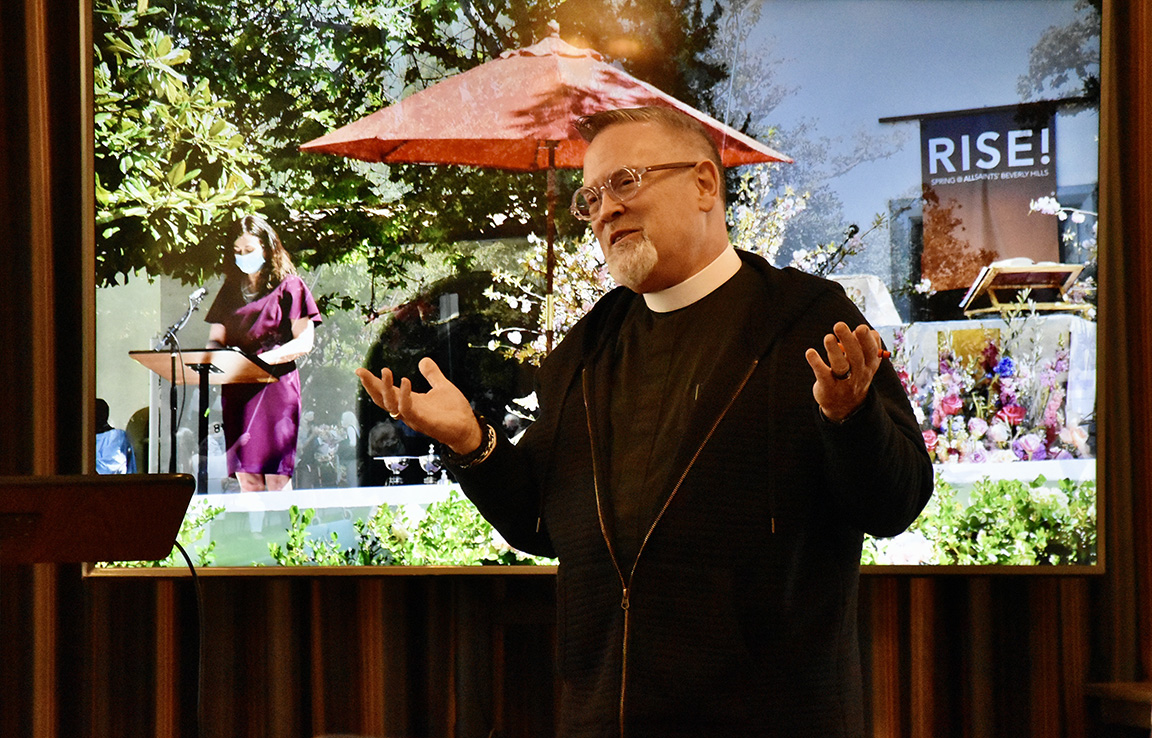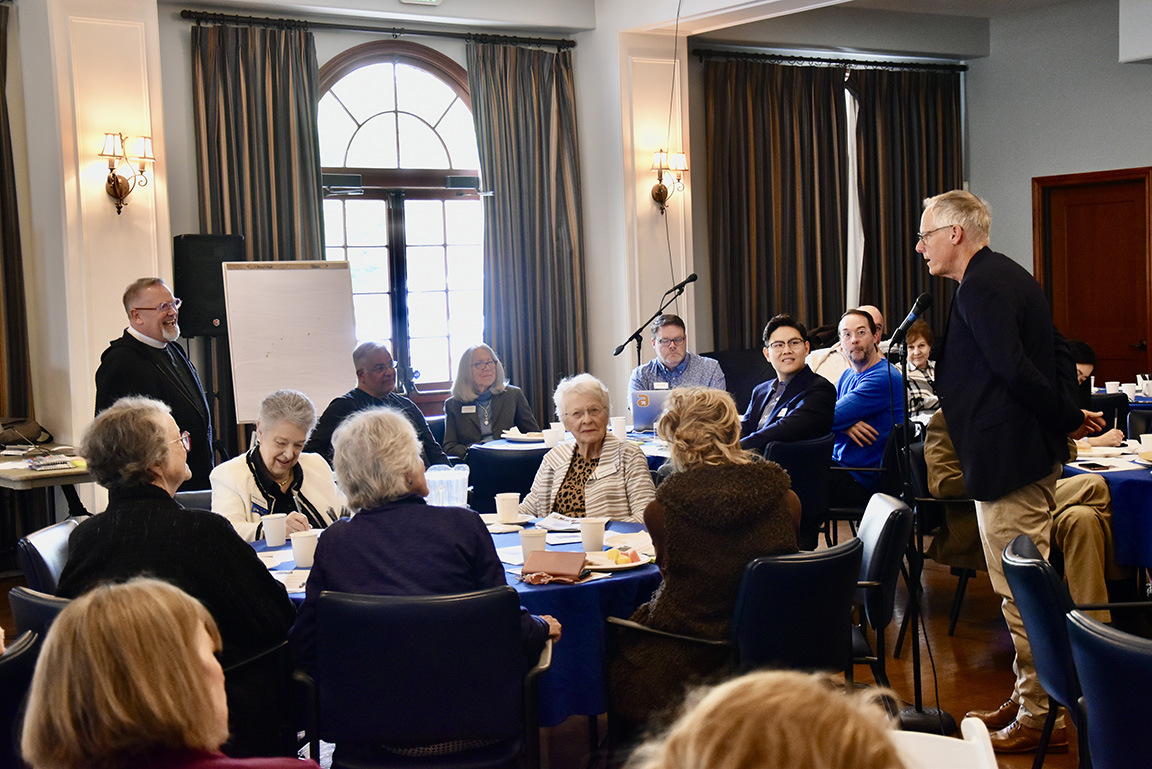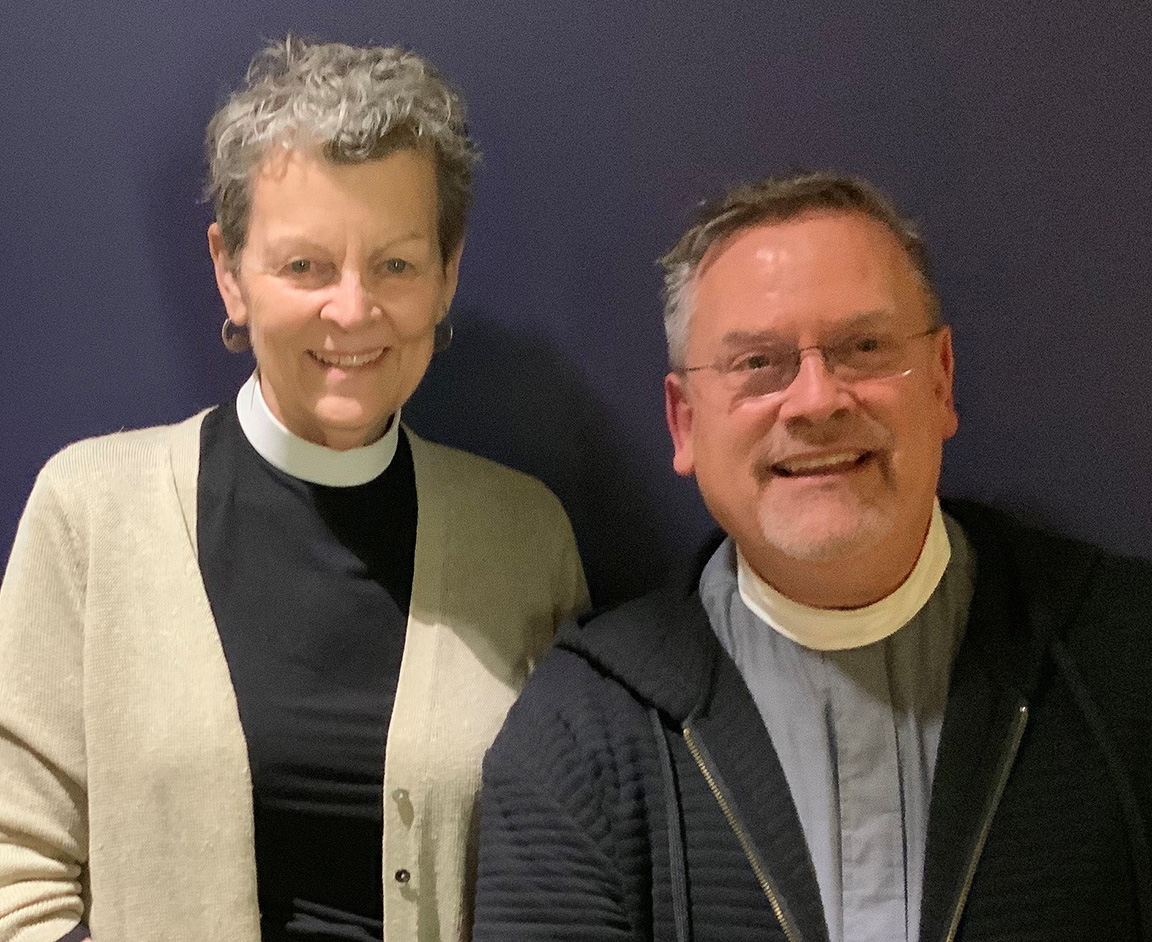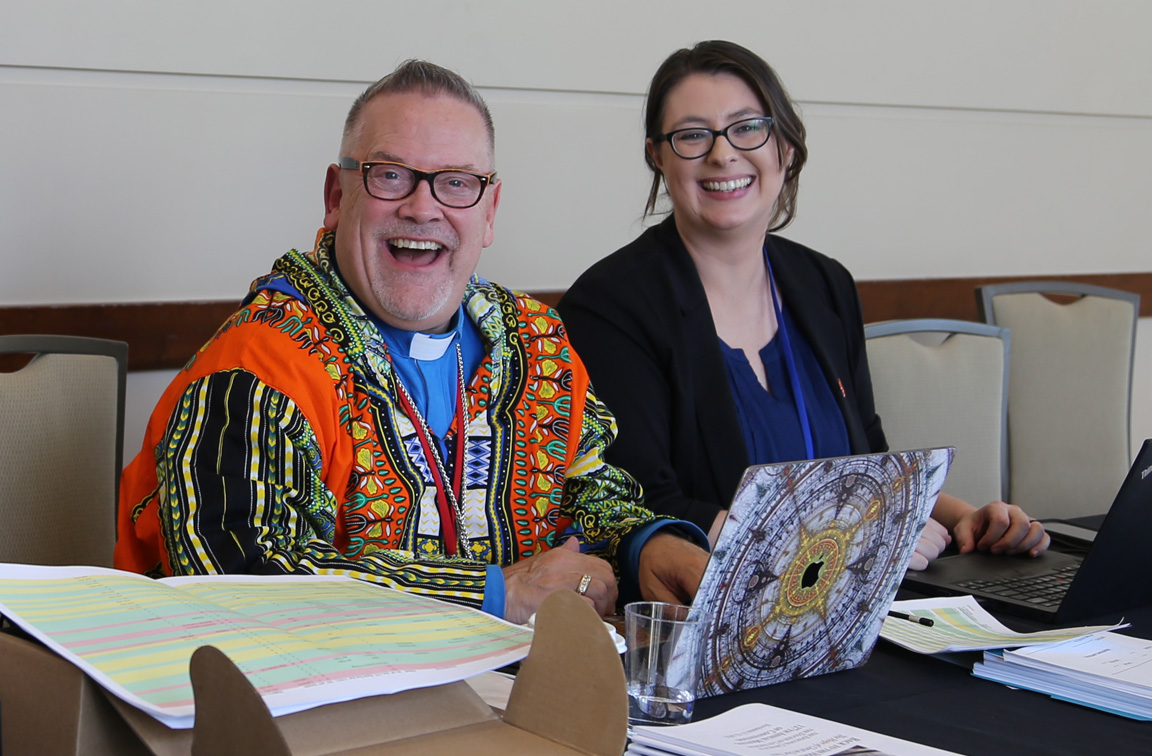
Tom Quijada-Discavage leads a “story day” at All Saints Church, Beverly Hills. Photo: Colleen Dodson Baker
[The Episcopal News] When the Rev. Tom Quijada-Discavage isn’t shepherding congregations through transitions, he is leading another flock as priest-in-charge at St. Philip’s Episcopal Church in Los Angeles.
Or he’s helping to plan the annual conference for the clergy of the diocese. Or working with clergy who are hoping to come to the Los Angeles diocese, while also supporting those who are retiring, or who are leaving ministry. And providing formation opportunities for the recently ordained.
“Today I had two Zoom calls with clergy who have expressed interest in looking at possible calls in the diocese,” he told The Episcopal News recently. “We get a number of people who think they want to come here or might have family connections here and have a desire to connect or be closer to them.”
But “the great challenge is the cost of living here; making that a possibility for people who don’t quite get the picture of what cost of living entails.”
As of August the median listing home price in Los Angeles is about $1.2 million, trending up 22.5% year over year, according to Realtor.com. Reports place the cost of living in Los Angeles at 6% higher than the state average, and 50% higher than the national average. According to RentCafe, a nationwide internet listing service for renters, housing in Los Angeles is 140% more expensive than the rest of the country, while utilities are about 11% pricier. Both groceries and clothing rank about 16% higher than elsewhere in the U.S.
There are other challenges, including an unprecedented transition wave, Discavage said. “Transition has been affected by Covid, and by the changing face of the church, by the necessity for less-than-fulltime ministry in congregations because of declining numbers or communities changing. We’re seeing unprecedented numbers of clergy retiring and a large number of retirements even earlier than the mandatory age, 72,” he said.
An October 2021 Barna Group survey revealed that more than a third – 38% – of Protestant pastors had seriously considered quitting full-time ministry, up nearly a third from January of that same year.
And while the trend is challenging, Discavage said, “it’s also exciting because it’s calling us all to think outside the box and look at the other possibilities that are different than what we’ve done before. Transitions will call us to live and work together in ways we may not have in the past and maybe never thought we would have to.”

Discavage listens as a parishioner speaks at story day at All Saints, Beverly Hills. Photo: Colleen Dodson Baker
Helping clergy and lay leaders navigate these challenges is a major part of Discavage’s job.
Holly Valiquette, 56, then senior warden, remembers making frequent panicked calls to Discavage during the most recent rector search at St. Francis’ Church in Rancho Palos Verdes. “I’d say, ‘okay, what do I do about this?’ One of the functions of Tom was just reassuring me that the diocese was there for me as a senior warden.”
She recalled: “I’d have my shoulders up around my ears and I’d be talking real fast and Tom would help me get to a peaceful place where I could understand the process, what the parish needed, and what the next step was.”
Valiquette, owner of two insurance inspection companies, recalled, “I was also planning my own wedding. It was quite a bit for a volunteer. Tom was really great about explaining the steps of the search, what it would look like; really good at helping me understand what to put psychic energy around and what not to worry so much about. There was a lot on my plate, and on everybody’s plate at the time.
“He was so present for us,” she added. “Tom made the diocese feel right there with us at St. Francis’. I wish there was a way to convey that I’m so grateful to him. He always took our calls, answered our questions, went the extra mile, that we could ask questions about the process and didn’t have to be experts overnight.”
Louise Stover, senior warden at St. Michael and All Angels in Corona del Mar during their search, said, “Tom was always there to talk me off the ledge. We were in a state of flux.”
She had been senior warden just five weeks “when we shut down for Covid. In November, the rector retired. “Our process extended the full two years and throughout Tom was available to us at any time we needed to be shepherded through all the steps, to get to where we’d be strong enough to make a call,” she recalled. “During our search, the [slate] of applicants changed completely, which is still shocking.”
Discavage was “very easy to work with, a good communicator. He keeps a lot of balls in the air, yet he never kept me waiting on anything,” Stover recalled. “As I became aware of the number of parishes going through the same process, it was eye opening to me to think of how much he was juggling and all the balls he was keeping in the air at the same time, yet he was always calming and encouraging.”

Discavage poses with Joanna Satorius, his predecessor as vocations officer. File photo
The days are long and sometimes challenging, yet Discavage remains positive, upbeat and embodies “what it means to be a Christian,” recalled the Rev. Canon Joanna Satorius, his predecessor, who retired in 2020.
“He’s very honest and real and if he’s got days that are high pressure, he doesn’t spill it over on other people, but is honest about it,” added Satorius, during a recent telephone interview from Tucson, Arizona.
Satorius recalled initially believing the role was an 8-to-5 position and then realizing that congregational needs can pop up at any time.
It helps that Discavage is “super organized” in a role that can be complicated, she said. “It’s a hugely pastoral position because you need to be able to hear the leadership of the congregations. Or, as a Title IV [misconduct] officer you need to be available to hear if somebody has a complaint and lend that some credibility,” Satorius said. “Tom is a superstar in my opinion. He’s absolutely indispensable.”
Discavage always makes time for joy or laughter, even on long days, according to the Rev. Norma Guerra, diocesan associate for formation and transitions, who oversees the discernment process and those considering a call to ordained ministry.
“At the beginning I knew it was going to be a lot of work, and the work is exhausting and demanding. I’m grateful because Tom has this institutional memory of things. You need the knowledge of the diocese, of the clergy, and knowledge of different churches and missions, and he knows them.”
Plus, “he is always eager to help. I’m grateful for him and his ministry and everything he does for the church,” said Guerra, who took over her role in December 2020. “It can be a hard day but in the middle there is time for laughing and joy. We make a good team.”
Discavage also serves as backup and support to Guerra, doubles as the diocesan intake officer for Title IV misconduct complaints, conducts mutual ministry reviews with vestries and bishop’s committees, and leads history days for transitioning congregations.

Diocesan conventions are all-hands-on-deck events for diocesan staff. Here Discavage and Samantha Wylie, convention coordinator, greet delegates at the 2022 meeting in Riverside. Photo: Janet Kawamoto
“I remind congregations that transition is an organic process,” he says. “We can’t set a timeline on any of it. Any single factor can shift the direction or need during transition time. We need to be sensitive to a deep appreciation for the work of the Holy Spirit in the process. The best thing we can do is to understand the fullness of who we are as a congregation with our less-than-stellar parts and our amazingly wonderful parts. Both come together in the fullness of who we are – and to never lose hope, because the Spirit will send us in the right direction.”
With each congregational contact, he shares “three simple truths: God is good; faith is strong; and all will be well. I remind them to relax and take a breath.”
During history days, rather than focus exclusively on the past, he prefers to ask such questions as, “What has made you smile about what you’ve heard about the church? How have the things that have gone on here affected you personally, your family, those you care about? How does your own personal story fit into the wider story of the diocese?”
There is also time for calling forth dreams. “What would our greatest dream be for this place if we could dream dreams? What are the greatest challenges we face as we look forward to the next chapter of our story? And, if we could paint a picture of our next clergy, what would they look like? Not a physical picture, but their qualities and how they would interact with everyone. We’re not talking about filling a position, but about building a relationship.”
Discavage also serves as board vice president for Holy Family Adoption Services, Inc., an institution of the diocese, a role he cherishes. Born and raised in Buffalo, New York, “I am an only and adopted child,” he said.
He studied business management at Canisius College in the Buffalo area and began working as an assistant to the vice president and inside sales manager for a pneumatics and hydraulics company.
After earning an M.Div in 1988 at Christ the King Seminary in Aurora, New York, he was ordained a priest in the Roman Catholic Church in April 1989 and served in a variety of rural and suburban parishes until 1994.
He was received as an Episcopal priest in May 2002. Before moving to Los Angeles in October 2003, he served as interim rector of Christ Episcopal Church in Albion, New York.
He has also served several Southland congregations, including as rector of St. Barnabas, Eagle Rock (2004 – 2008); vicar for administration and chief of staff at St. James in the City (2008 – 2013); and then as interim rector and priest-in-charge at St. James’ from 2013 to 2015.
Discavage recently announced a revised Fresh Start program, titled “Anima – Ministry’s Soul / Tending the heart of our call.” Fresh Start is a collaborative offering of The Episcopal Church Office for Ministry Development, the Church Deployment Office and others that helps equip dioceses, congregations, clergy and laity to grow during times of transition.
“It’s going to be group-specific so if there are certain issues that present themselves in a given program year, we will look at that,” he told The News. “We will also work together with some of the topic-specific areas like finance, reporting and budgeting, diocesan financial requirements, and convention paperwork, all the nitty-gritty things everybody comes and asks us about.”
